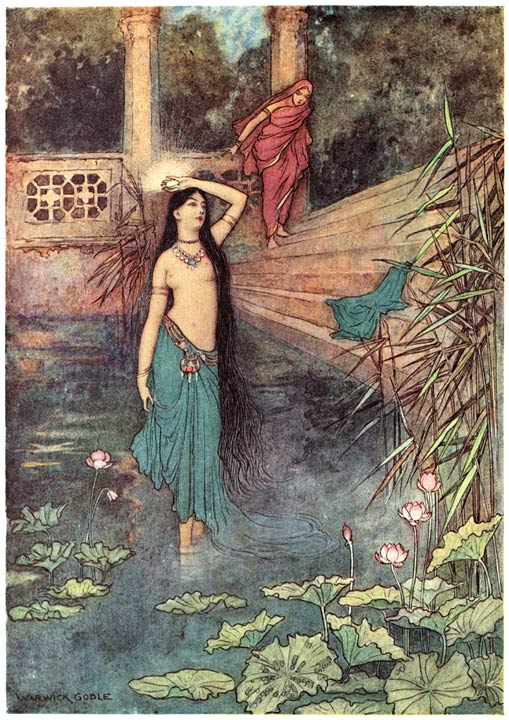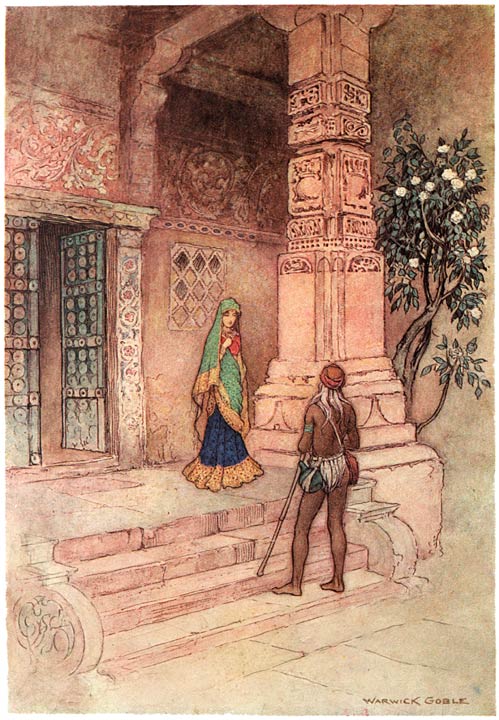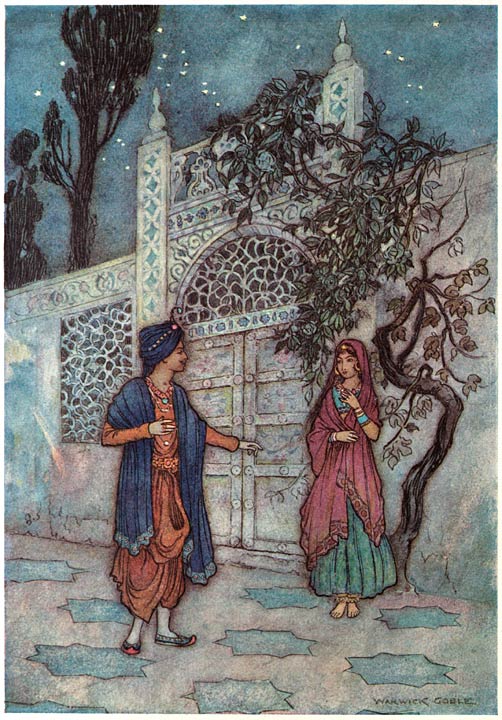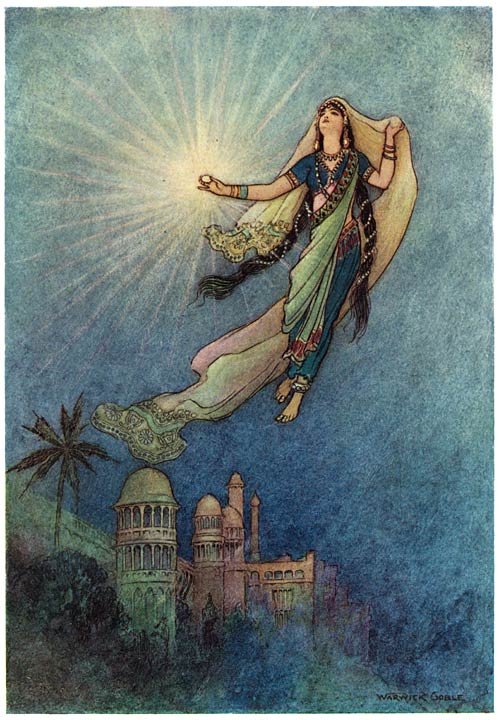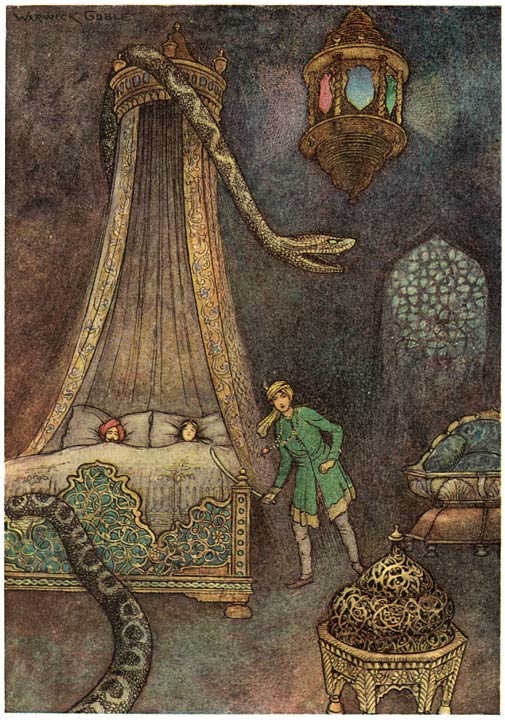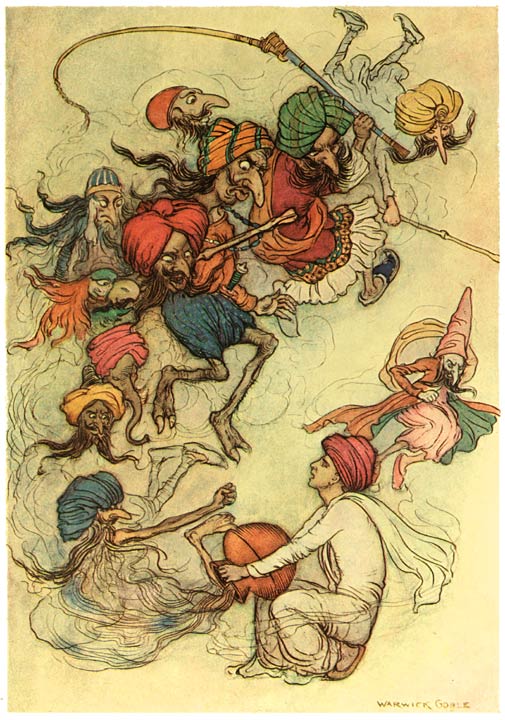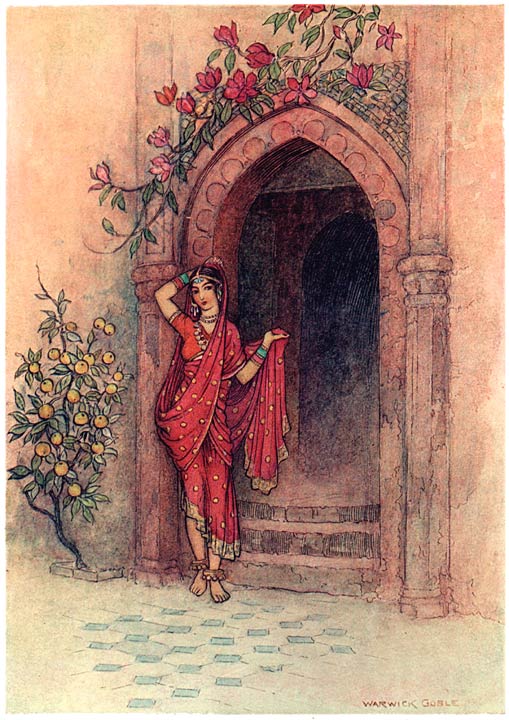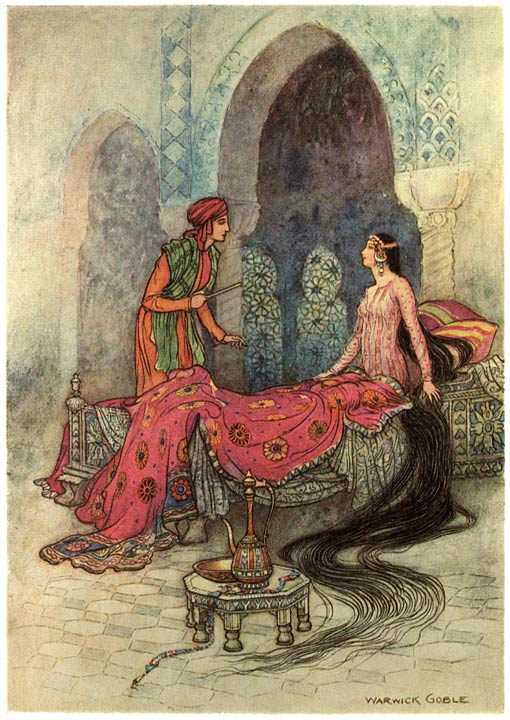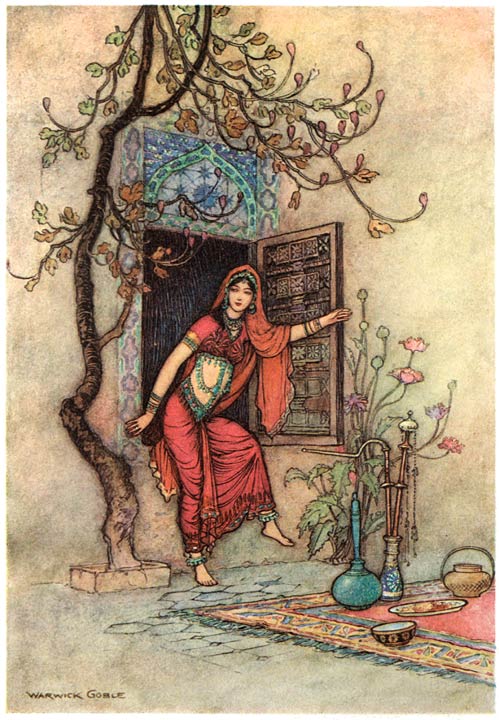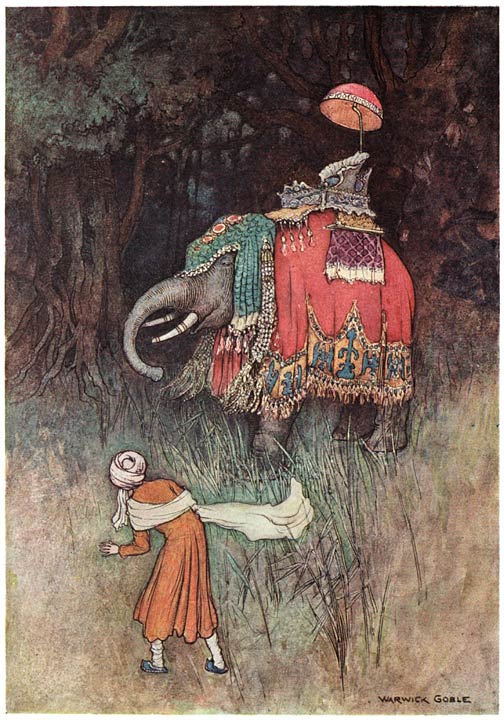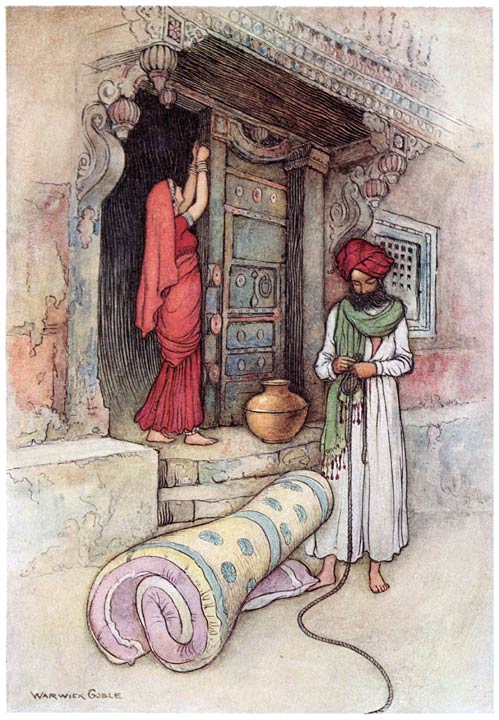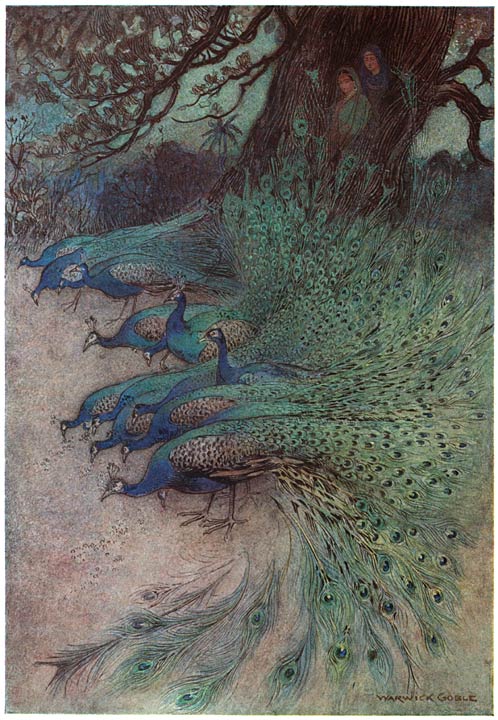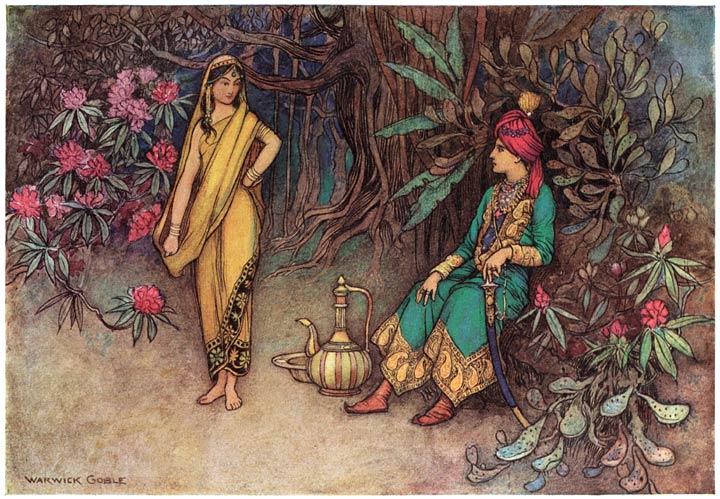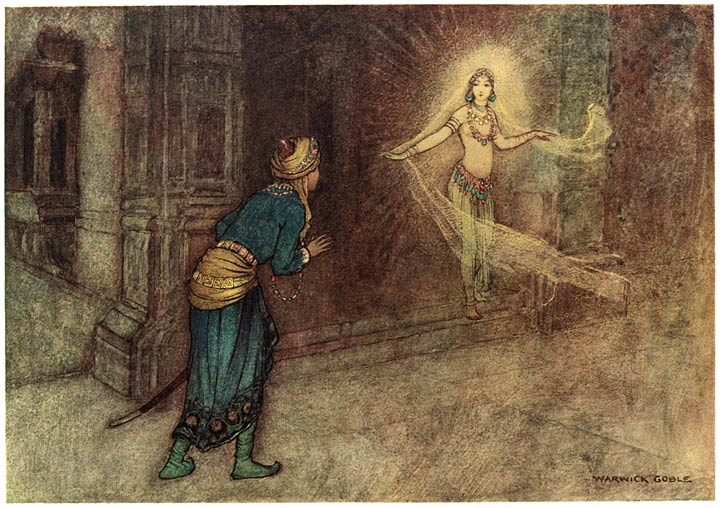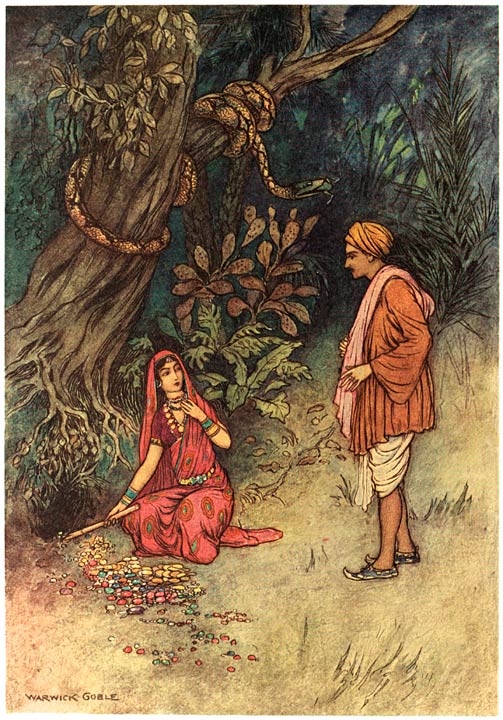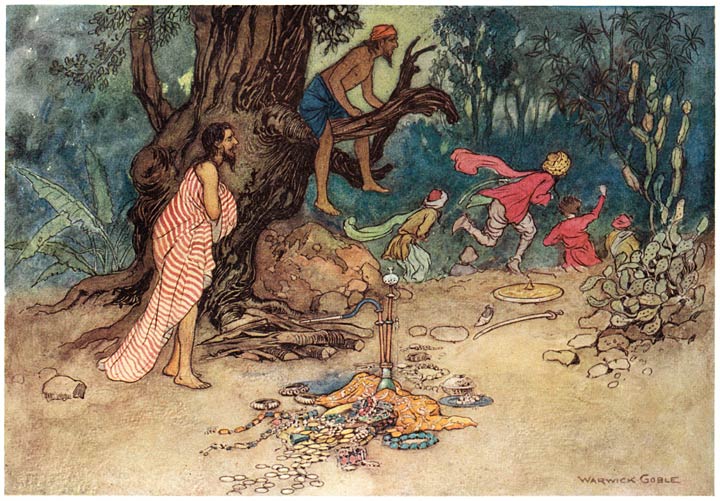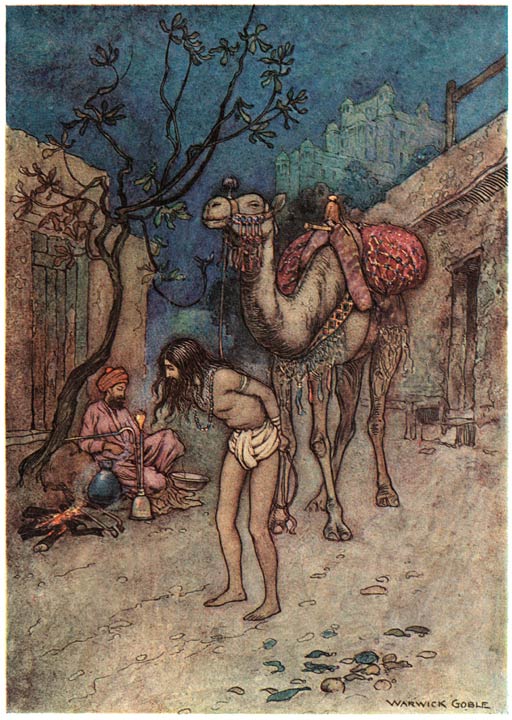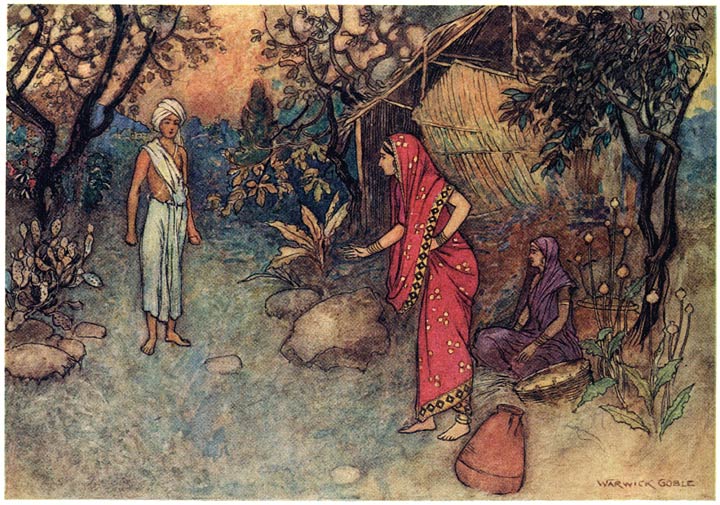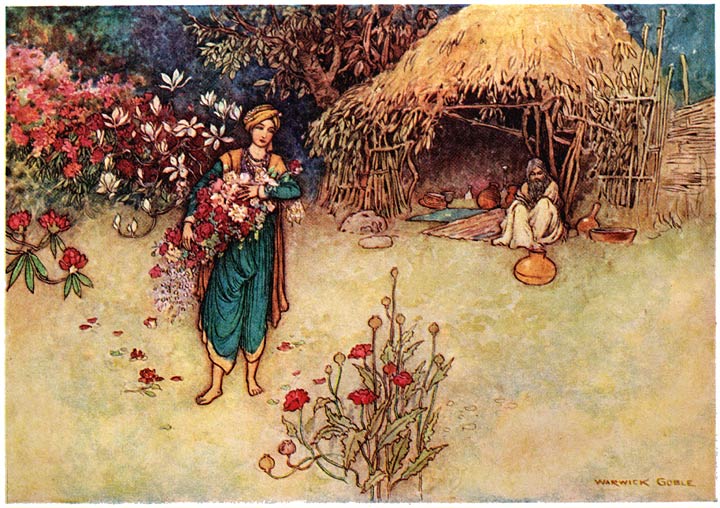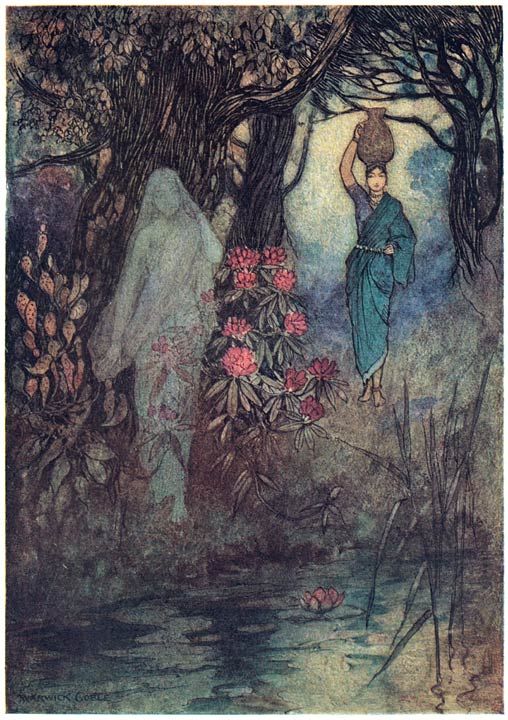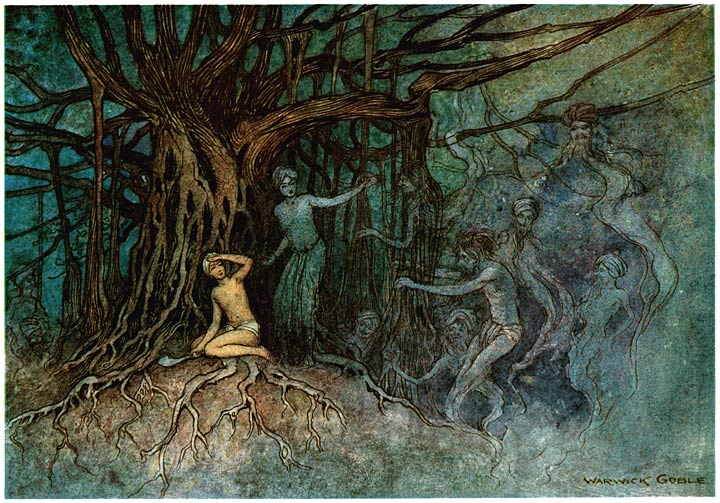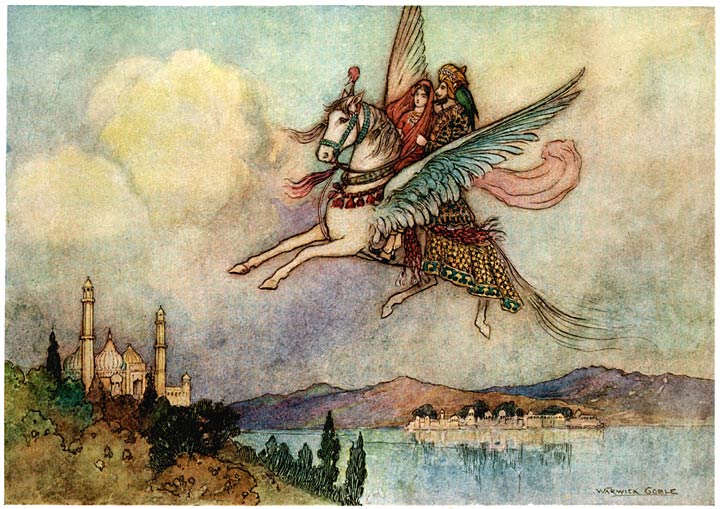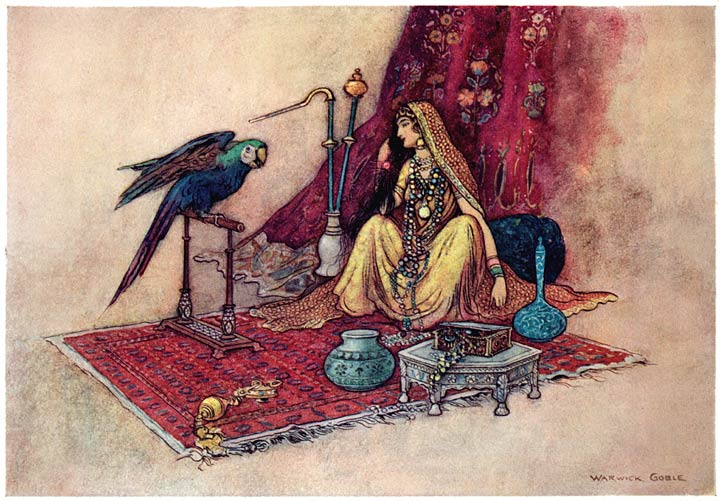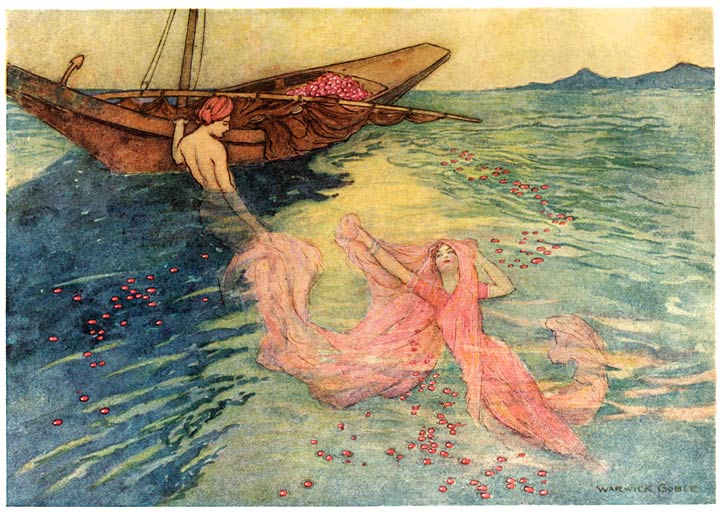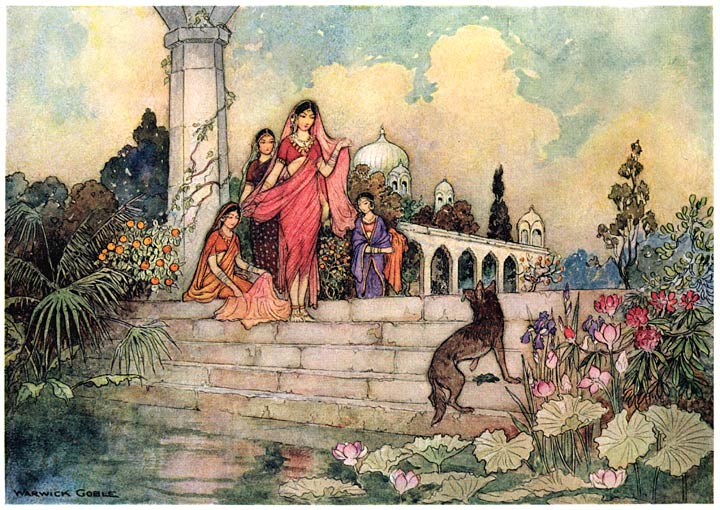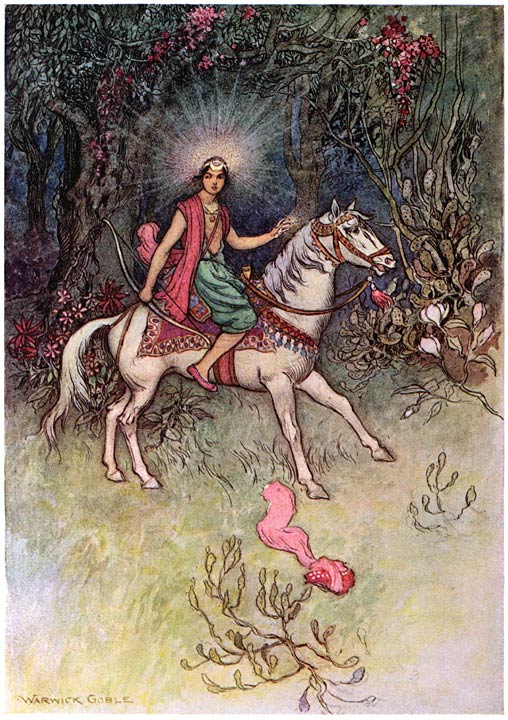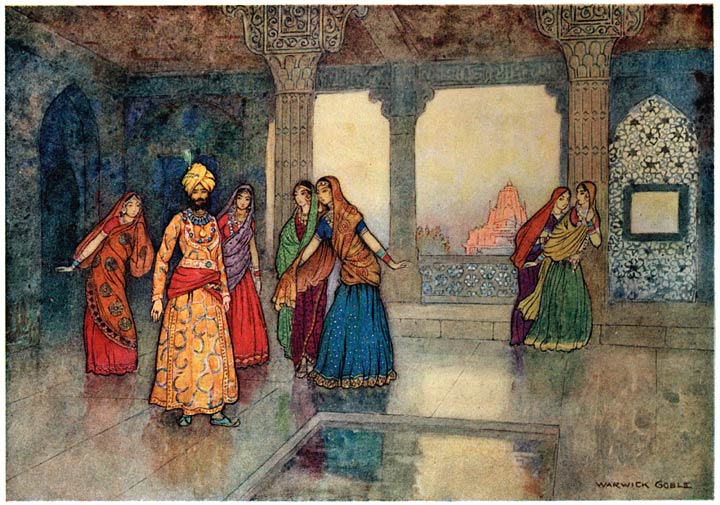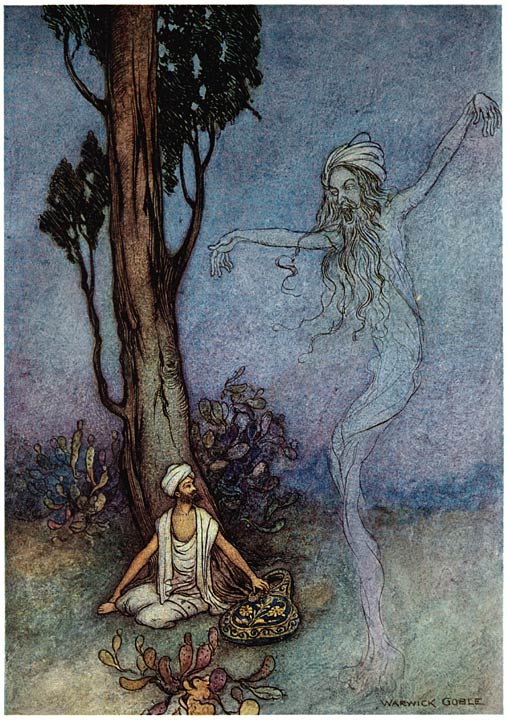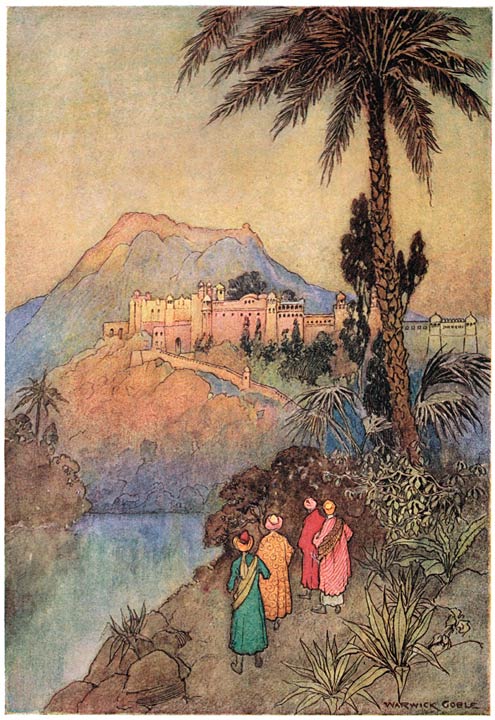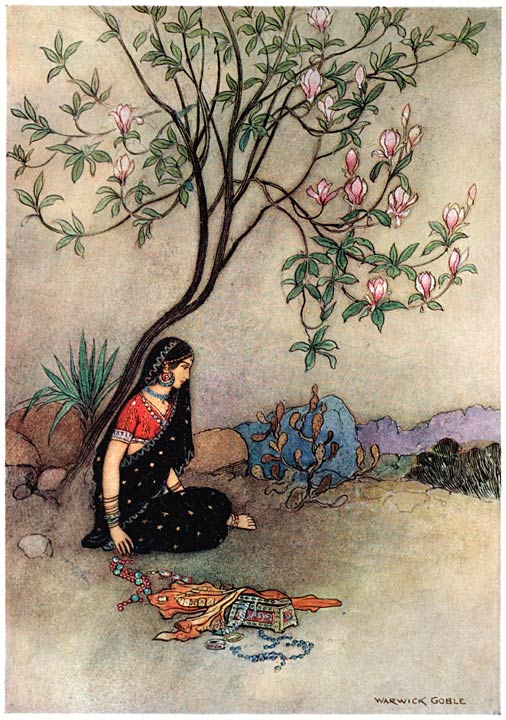There was a king’s son, and there was a
minister’s son. They loved each other dearly; they sat together,
they stood up together, they walked together, they ate together, they
slept together, they got up together. In this way they spent many years
in each other’s company, till they both felt a desire to see
foreign lands. So one day they set out on their journey. Though very
rich, the one being the son of a king and the other the son of his
chief minister, they did not take any servants with them; they went by
themselves on horseback. The horses were beautiful to look at; they
were pakshirajes, or kings of birds. The king’s son and
the minister’s son rode together many days. They passed through
extensive plains covered with paddy; through cities, towns, and
villages; through waterless, treeless deserts; through dense forests
which were the abode of the tiger and the bear. One evening they were
overtaken by night in a region where human habitations were not seen;
and as it was getting darker and darker, they dismounted beneath a
lofty tree, tied their horses to its trunk, [17]and,
climbing up, sat on its branches covered with thick foliage. The tree
grew near a large tank, the water of which was as clear as the eye of a
crow. The king’s son and the minister’s son made themselves
as comfortable as they could on the tree, being determined to spend on
its branches the livelong night. They sometimes chatted together in
whispers on account of the lonely terrors of the region; they sometimes
sat demurely silent for some minutes; and anon they were falling into a
doze, when their attention was arrested by a terrible sight.
A sound like the rush of many waters was heard from the middle of
the tank. A huge serpent was seen leaping up from under the water with
its hood of enormous size. It “lay floating many a rood”;
then it swam ashore, and went about hissing. But what most of all
attracted the attention of the king’s son and the
minister’s son was a brilliant manikya (jewel) on the
crested hood of the serpent. It shone like a thousand diamonds. It lit
up the tank, its embankments, and the objects round about. The serpent
doffed the jewel from its crest and threw it on the ground, and then it
went about hissing in search of food. The two friends sitting on the
tree greatly admired the wonderful brilliant, shedding ineffable lustre
on everything around. They had never before seen anything like it; they
had only heard of it as equalling the treasures of seven kings. Their
admiration, however, was soon changed into sorrow and fear; for the
serpent came hissing to the foot [18]of the tree on the branches of
which they were seated, and swallowed up, one by one, the horses tied
to the trunk. They feared that they themselves would be the next
victims, when, to their infinite relief, the gigantic cobra turned away
from the tree, and went about roaming to a great distance. The
minister’s son, seeing this, bethought himself of taking
possession of the lustrous stone. He had heard that the only way to
hide the brilliant light of the jewel was to cover it with cow-dung or
horse-dung, a quantity of which latter article he perceived lying at
the foot of the tree. He came down from the tree softly, picked up the
horse-dung, threw it upon the precious stone, and again climbed into
the tree. The serpent, not perceiving the light of its head-jewel,
rushed with great fury to the spot where it had been left. Its
hissings, groans, and convulsions were terrible. It went round and
round the jewel covered with horse-dung, and then breathed its last.
Early next morning the king’s son and the minister’s son
alighted from the tree, and went to the spot where the crest-jewel was.
The mighty serpent lay there perfectly lifeless. The minister’s
son took up in his hand the jewel covered with horse-dung; and both of
them went to the tank to wash it. When all the horse-dung had been
washed off, the jewel shone as brilliantly as before. It lit up the
entire bed of the tank, and exposed to their view the innumerable
fishes swimming about in the waters. But what was their astonishment
when they saw, by the light of the jewel, in the bottom of the
[19]tank, the lofty walls of what seemed a magnificent
palace. The venturesome son of the minister proposed to the prince that
they should dive into the waters and get at the palace below. They both
dived into the waters—the jewel being in the hand of the
minister’s son—and in a moment stood at the gate of the
palace. The gate was open. They saw no being, human or superhuman. They
went inside the gate, and saw a beautiful garden laid out on the ample
grounds round about the house which was in the centre. The king’s
son and the minister’s son had never seen such a profusion of
flowers. The rose with its many varieties, the jessamine, the
bel, the mallika, the king of smells, the lily of
the valley, the Champaka, and a thousand other sorts of
sweet-scented flowers were there. And of each of these flowers there
seemed to be a large number. Here were a hundred rose-bushes, there
many acres covered with the delicious jessamine, while yonder were
extensive plantations of all sorts of flowers. As all the plants were
begemmed with flowers, and as the flowers were in full bloom, the air
was loaded with rich perfume. It was a wilderness of sweets. Through
this paradise of perfumery they proceeded towards the house, which was
surrounded by banks of lofty trees. They stood at the door of the
house. It was a fairy palace. The walls were of burnished gold, and
here and there shone diamonds of dazzling hue which were stuck into the
walls. They did not meet with any beings, human or other. They went
inside, which was richly furnished. They [20]went from room to room,
but they did not see any one. It seemed to be a deserted house. At
last, however, they found in one room a young lady lying down,
apparently in sleep, on a bed of golden framework. She was of exquisite
beauty; her complexion was a mixture of red and white; and her age was
apparently about sixteen. The king’s son and the minister’s
son gazed upon her with rapture; but they had not stood long when this
young lady of superb beauty opened her eyes, which seemed like those of
a gazelle. On seeing the strangers she said: “How have you come
here, ye unfortunate men? Begone, begone! This is the abode of a mighty
serpent, which has devoured my father, my mother, my brothers, and all
my relatives; I am the only one of my family that he has spared. Flee
for your lives, or else the serpent will put you both in its capacious
maw.” The minister’s son told the princess how the serpent
had breathed its last; how he and his friend had got possession of its
head-jewel, and by its light had come to her palace. She thanked the
strangers for delivering her from the infernal serpent, and begged of
them to live in the house, and never to desert her. The king’s
son and the minister’s son gladly accepted the invitation. The
king’s son, smitten with the charms of the peerless princess,
married her after a short time; and as there was no priest there, the
hymeneal knot was tied by a simple exchange of garlands of flowers.
The king’s son became inexpressibly happy in the company of
the princess, who was as amiable [21]in her disposition as she was
beautiful in her person; and though the wife of the minister’s
son was living in the upper world, he too participated in his
friend’s happiness. Time thus passed merrily, when the
king’s son bethought himself of returning to his native country;
and as it was fit that he should go with his princess in due pomp, it
was determined that the minister’s son should first ascend from
the subaqueous regions, go to the king, and bring with him attendants,
horses, and elephants for the happy pair. The snake-jewel was therefore
had in requisition. The prince, with the jewel in hand, accompanied the
minister’s son to the upper world, and bidding adieu to his
friend returned to his lovely wife in the enchanted palace. Before
leaving, the minister’s son appointed the day and the hour when
he would stand on the high embankments of the tank with horses,
elephants, and attendants, and wait upon the prince and the princess,
who were to join him in the upper world by means of the jewel.
Leaving the minister’s son to wend his way to his country and
to make preparations for the return of his king’s son, let us see
how the happy couple in the subterranean palace were passing their
time. One day, while the prince was sleeping after his noonday meal,
the princess, who had never seen the upper regions, felt the desire of
visiting them, and the rather as the snake-jewel, which alone could
give her safe conduct through the waters, was at that moment shedding
its bright effulgence in the room. She took up the [22]jewel in
her hand, left the palace, and successfully reached the upper world. No
mortal caught her sight. She sat on the flight of steps with which the
tank was furnished for the convenience of bathers, scrubbed her body,
washed her hair, disported in the waters, walked about on the
water’s edge, admired all the scenery around, and returned to her
palace, where she found her husband still locked in the embrace of
sleep. When the prince woke up, she did not tell him a word about her
adventure. The following day at the same hour, when her husband was
asleep, she paid a second visit to the upper world, and went back
unnoticed by mortal man. As success made her bold, she repeated her
adventure a third time. It so chanced that on that day the son of the
Rajah, in whose territories the tank was situated, was out on a hunting
excursion, and had pitched his tent not far from the place. While his
attendants were engaged in cooking their noon-day meal, the
Rajah’s son sauntered about on the embankments of the tank, near
which an old woman was gathering sticks and dried branches of trees for
purposes of fuel. It was while the Rajah’s son and the old woman
were near the tank that the princess paid her third visit to the upper
world. She rose up from the waters, gazed around, and seeing a man and
a woman on the banks again went down. The Rajah’s son caught a
momentary glimpse of the princess, and so did the old woman gathering
sticks. The Rajah’s son stood gazing on the waters. He had never
seen such a beauty. [23]She seemed to him to be one of those
deva-kanyas, heavenly goddesses, of whom he had read in old
books, and who are said now and then to favour the lower world with
their visits, which, like angel visits, are “few and far
between.” The unearthly beauty of the princess, though he had
seen her only for a moment, made a deep impression on his heart, and
distracted his mind. He stood there like a statue, for hours, gazing on
the waters, in the hope of seeing the lovely figure again. But in vain.
The princess did not appear again. The Rajah’s son became mad
with love. He kept muttering—“Now here, now gone! Now here,
now gone!” He would not leave the place till he was forcibly
removed by the attendants who had now come to him. He was taken to his
father’s palace in a state of hopeless insanity. He spoke to
nobody; he always sobbed heavily; and the only words which proceeded
out of his mouth—and he was muttering them every
minute—were, “Now here, now gone! Now here, now
gone!” The Rajah’s grief may well be conceived. He could
not imagine what should have deranged his son’s mind. The words,
“Now here, now gone,” which ever and anon issued from his
son’s lips, were a mystery to him; he could not unravel their
meaning; neither could the attendants throw any light on the subject.
The best physicians of the country were consulted, but to no effect.
The sons of Æsculapius could not ascertain the cause of the
madness, far less could they cure it. To the many inquiries of the
[24]physicians, the only reply made by the
Rajah’s son was the stereotyped words—“Now here, now
gone! Now here, now gone!”
The Rajah, distracted with grief on account of the obscuration of
his son’s intellects, caused a proclamation to be made in the
capital by beat of drum, to the effect that, if any person could
explain the cause of his son’s madness and cure it, such a person
would be rewarded with the hand of the Rajah’s daughter, and with
the possession of half his kingdom. The drum was beaten round most
parts of the city, but no one touched it, as no one knew the cause of
the madness of the Rajah’s son. At last an old woman touched the
drum, and declared that she would not only discover the cause of the
madness, but cure it. This woman, who was the identical woman that was
gathering sticks near the tank at the time the Rajah’s son lost
his reason, had a crack-brained son of the name of Phakir Chand, and
was in consequence called Phakir’s mother, or more familiarly
Phakre’s mother. When the woman was brought before the Rajah, the
following conversation took place:—
Rajah. You are the woman that touched the drum.—You
know the cause of my son’s madness?
Phakir’s Mother. Yes, O incarnation of justice! I know
the cause, but I will not mention it till I have cured your son.
Rajah. How can I believe that you are able to cure my son,
when the best physicians of the land have failed? [25]
Phakir’s Mother. You need not now believe, my lord,
till I have performed the cure. Many an old woman knows secrets with
which wise men are unacquainted.
Rajah. Very well, let me see what you can do. In what time
will you perform the cure?
Phakir’s Mother. It is impossible to fix the time at
present; but I will begin work immediately with your lordship’s
assistance.
Rajah. What help do you require from me?
Phakir’s Mother. Your lordship will please order a hut
to be raised on the embankment of the tank where your son first caught
the disease. I mean to live in that hut for a few days. And your
lordship will also please order some of your servants to be in
attendance at a distance of about a hundred yards from the hut, so that
they might be within call.
Rajah. Very well; I will order that to be immediately done.
Do you want anything else?
Phakir’s Mother. Nothing else, my lord, in the way of
preparations. But it is as well to remind your lordship of the
conditions on which I undertake the cure. Your lordship has promised to
give to the performer of the cure the hand of your daughter and half
your kingdom. As I am a woman and cannot marry your daughter, I beg
that, in case I perform the cure, my son Phakir Chand may marry your
daughter and take possession of half your kingdom.
Rajah. Agreed, agreed.
A temporary hut was in a few hours erected [26]on the
embankment of the tank, and Phakir’s mother took up her abode in
it. An outpost was also erected at some distance for servants in
attendance who might be required to give help to the woman. Strict
orders were given by Phakir’s mother that no human being should
go near the tank excepting herself. Let us leave Phakir’s mother
keeping watch at the tank, and hasten down into the subterranean palace
to see what the prince and the princess are about. After the mishap
which had occurred on her last visit to the upper world, the princess
had given up the idea of a fourth visit. But women generally have
greater curiosity than men; and the princess of the underground palace
was no exception to the general rule. One day, while her husband was
asleep as usual after his noonday meal, she rushed out of the palace
with the snake-jewel in her hand, and came to the upper world. The
moment the upheaval of the waters in the middle of the tank took place,
Phakir’s mother, who was on the alert, concealed herself in the
hut and began looking through the chinks of the matted wall. The
princess, seeing no mortal near, came to the bank, and sitting there
began to scrub her body. Phakir’s mother showed herself outside
the hut, and addressing the princess, said in a winning
tone—“Come, my child, thou queen of beauty, come to me, and
I will help you to bathe.” So saying, she approached the
princess, who, seeing that it was only a woman, made no resistance. The
old woman, while in the act of washing the hair of [27]the
princess, noticed the bright jewel in her hand, and
said—“Put the jewel here till you are bathed.” In a
moment the jewel was in the possession of Phakir’s mother, who
wrapped it up in the cloth that was round her waist. Knowing the
princess to be unable to escape, she gave the signal to the attendants
in waiting, who rushed to the tank and made the princess a captive.
Great were the rejoicings of the people when the tidings reached the
city that Phakir’s mother had captured a water-nymph from the
nether regions. The whole city came to see the “daughter of the
immortals,” as they called the princess. When she was brought to
the palace and confronted with the Rajah’s son of obscured
intellect, the latter said with a shout of exultation—“I
have found! I have found!” The cloud which had settled on his
brain was dissipated in a moment. The eyes, erewhile vacant and
lustreless, now glowed with the fire of intelligence; his tongue, of
which he had almost lost the use—the only words which he used to
utter being, “Now here, now gone!”—was now relaxed:
in a word, he was restored to his senses. The joy of the Rajah knew no
bounds. There was great festivity in the city; and the people who
showered benedictions on the head of Phakir Chand’s mother,
expected the speedy celebration of the marriage of the Rajah’s
son with the beauty of the nether world. The princess, however, told
the Rajah, through Phakir’s mother, that she had made a vow to
the effect that she would not, for one whole year, look [28]at the
face of another man than that of her husband who was dwelling beneath
the waters, and that therefore the marriage could not be performed
during that period. Though the Rajah’s son was somewhat
disappointed, he readily agreed to the delay, believing, agreeably to
the proverb, that delay would greatly enhance the sweetness of those
pleasures which were in store for him.
It is scarcely necessary to say that the princess spent her days and
her nights in sorrowing and sighing. She lamented that idle curiosity
which had led her to come to the upper world, leaving her husband
below. When she recollected that her husband was all alone below the
waters she wept bitter tears. She wished she could run away. But that
was impossible, as she was immured within walls, and there were walls
within walls. Besides, if she could get out of the palace and of the
city, of what avail would it be? She could not gain her husband, as the
serpent jewel was not in her possession. The ladies of the palace and
Phakir’s mother tried to divert her mind, but in vain. She took
pleasure in nothing; she would hardly speak to any one; she wept day
and night. The year of her vow was drawing to a close, and yet she was
disconsolate. The marriage, however, must be celebrated. The Rajah
consulted the astrologers, and the day and the hour in which the
nuptial knot was to be tied were fixed. Great preparations were made.
The confectioners of the city busied themselves day and night in
preparing sweetmeats; milkmen took contracts for supplying the palace
with tanks of [29]curds; gunpowder was being manufactured for a
grand display of fireworks; bands of musicians were placed on sheds
erected over the palace gate, who ever and anon sent forth many
“a bout of linked sweetness”; and the whole city assumed an
air of mirth and festivity.
It is time we should think of the minister’s son, who, leaving
his friend in the subterranean palace, had gone to his country to bring
horses, elephants, and attendants for the return of the king’s
son and his lovely princess with due pomp. The preparations took him
many months; and when everything was ready he started on his journey,
accompanied by a long train of elephants, horses, and attendants. He
reached the tank two or three days before the appointed day. Tents were
pitched in the mango-topes adjoining the tank for the accommodation of
men and cattle; and the minister’s son always kept his eyes fixed
on the tank. The sun of the appointed day sank below the horizon; but
the prince and the princess dwelling beneath the waters made no sign.
He waited two or three days longer; still the prince did not make his
appearance. What could have happened to his friend and his beautiful
wife? Were they dead? Had another serpent, possibly the mate of the one
that had died, beaten the prince and the princess to death? Had they
somehow lost the serpent-jewel? Or had they been captured when they
were once on a visit to the upper world? Such were the reflections of
the minister’s son. He was overwhelmed with [30]grief.
Ever since he had come to the tank he had heard at regular intervals
the sound of music coming from the city which was not distant. He
inquired of passers-by what that music meant. He was told that the
Rajah’s son was about to be married to some wonderful young lady,
who had come out of the waters of that very tank on the bank of which
he was now seated, and that the marriage ceremony was to be performed
on the day following the next. The minister’s son immediately
concluded that the wonderful young lady of the lake that was to be
married was none other than the wife of his friend, the king’s
son. He resolved therefore to go into the city to learn the details of
the affair, and try if possible to rescue the princess. He told the
attendants to go home, taking with them the elephants and the horses;
and he himself went to the city, and took up his abode in the house of
a Brahman.
After he had rested and taken his dinner, the minister’s son
asked the Brahman what the meaning was of the music that was heard in
the city at regular intervals. The Brahman asked, “From what part
of the world have you come that you have not heard of the wonderful
circumstance that a young lady of heavenly beauty rose out of the
waters of a tank in the suburbs, and that she is going to be married
the day after to-morrow to the son of our Rajah?”
Minister’s Son. No, I have heard nothing. I have come
from a distant country whither the [31]story has not reached. Will you
kindly tell me the particulars?
Brahman. The Rajah’s son went out a-hunting about this
time last year. He pitched his tents close to a tank in the suburbs.
One day, while the Rajah’s son was walking near the tank, he saw
a young woman, or rather goddess, of uncommon beauty rise from the
waters of the tank. She gazed about for a minute or two and
disappeared. The Rajah’s son, however, who had seen her, was so
struck with her heavenly beauty that he became desperately enamoured of
her. Indeed, so intense was his passion, that his reason gave way; and
he was carried home hopelessly mad. The only words he uttered day and
night were—“Now here, now gone!” The Rajah sent for
all the best physicians of the country for restoring his son to his
reason; but the physicians were powerless. At last he caused a
proclamation to be made by beat of drum to the effect that if any one
could cure the Rajah’s son, he should be the Rajah’s
son-in-law and the owner of half his kingdom. An old woman, who went by
the name of Phakir’s mother, took hold of the drum, and declared
her ability to cure the Rajah’s son. On the tank where the
princess had appeared was raised for Phakir’s mother a hut in
which she took up her abode; and not far from her hut another hut was
erected for the accommodation of attendants who might be required to
help her. It seems the goddess rose from the waters; Phakir’s
mother seized her with the help of the [32]attendants, and carried
her in a palki to the palace. At the sight of her the
Rajah’s son was restored to his senses; and the marriage would
have been celebrated at that time but for a vow which the goddess had
made that she would not look at the face of any male person till the
lapse of a year. The year of the vow is now over; and the music which
you have heard is from the gate of the Rajah’s palace. This, in
brief, is the story.
Minister’s Son. A truly wonderful story! And has
Phakir’s mother, or rather Phakir Chand himself, been rewarded
with the hand of the Rajah’s daughter and with the possession of
half the kingdom?
Brahman. No, not yet. Phakir has not been got hold of. He is
a half-witted lad, or rather quite mad. He has been away for more than
a year from his home, and no one knows where he is. That is his manner;
he stays away for a long time, suddenly comes home, and again
disappears. I believe his mother expects him soon.
Minister’s Son. What like is he? and what does he do
when he returns home?
Brahman. Why, he is about your height, though he is somewhat
younger than you. He puts on a small piece of cloth round his waist,
rubs his body with ashes, takes the branch of a tree in his hand, and,
at the door of the hut in which his mother lives, dances to the tune of
dhoop! dhoop! dhoop! His articulation is very indistinct; and
when his mother says—“Phakir! stay with me for some
days,” he invariably answers [33]in his usual unintelligible
manner, “No, I won’t remain, I won’t remain.”
And when he wishes to give an affirmative answer, he says,
“Hoom,” which means “Yes.”
The above conversation with the Brahman poured a flood of light into
the mind of the minister’s son. He saw how matters stood. He
perceived that the princess of the subterranean palace must have alone
ventured out into the tank by means of the snake-jewel; that she must
have been captured alone without the king’s son; that the
snake-jewel must be in the possession of Phakir’s mother; and
that his friend, the king’s son, must be alone below the waters
without any means of escape. The desolate and apparently hopeless state
of his friend filled him with unutterable grief. He was in deep musings
during most part of the night. Is it impossible, thought he, to rescue
the king’s son from the nether regions? What if, by some means or
other, I contrive to get the jewel from the old woman? And can I not do
it by personating Phakir Chand himself, who is expected by his mother
shortly? And possibly by the same means I may be able to rescue the
princess from the Rajah’s palace. He resolved to act the
rôle of Phakir Chand the following day. In the morning he
left the Brahman’s house, went to the outskirts of the city,
divested himself of his usual clothing, put round his waist a short and
narrow piece of cloth which scarcely reached his knee-joints, rubbed
his body well with ashes, took in his hand a twig which he broke off a
tree, and [34]thus accoutred, presented himself before the door
of the hut of Phakir’s mother. He commenced operations by
dancing, in a most violent manner, to the tune of dhoop! dhoop!
dhoop! The dancing attracted the notice of the old woman, who,
supposing that her son had come, said—“My son Phakir, are
you come? Come, my darling; the gods have at last become propitious to
us.” The supposed Phakir Chand uttered the monosyllable
“hoom,” and went on dancing in a still more violent manner
than before, waving the twig in his hand. “This time you must not
go away,” said the old woman, “you must remain with
me.” “No, I won’t remain, I won’t
remain,” said the minister’s son. “Remain with me,
and I’ll get you married to the Rajah’s daughter. Will you
marry, Phakir Chand?” The minister’s son
replied—“Hoom, hoom,” and danced on like a madman.
“Will you come with me to the Rajah’s house? I’ll
show you a princess of uncommon beauty who has risen from the
waters.” “Hoom, hoom,” was the answer that issued
from his lips, while his feet tripped it violently to the sound of
dhoop! dhoop! “Do you wish to see a manik, Phakir,
the crest jewel of the serpent, the treasure of seven kings?”
“Hoom, hoom,” was the reply. The old woman brought out of
the hut the snake-jewel, and put it into the hand of her supposed son.
The minister’s son took it, and carefully wrapped it up in the
piece of cloth round his waist. Phakir’s mother, delighted beyond
measure at the opportune appearance of her [35]son,
went to the Rajah’s house, partly to announce to the Rajah the
news of Phakir’s appearance, and partly to show Phakir the
princess of the waters. The supposed Phakir and his mother found ready
access to the Rajah’s palace, for the old woman had, since the
capture of the princess, become the most important person in the
kingdom. She took him into the room where the princess was, and
introduced him to her. It is superfluous to remark that the princess
was by no means pleased with the company of a madcap, who was in a
state of semi-nudity, whose body was rubbed with ashes, and who was
ever and anon dancing in a wild manner. At sunset the old woman
proposed to her son that they should leave the palace and go to their
own house. But the supposed Phakir Chand refused to comply with the
request; he said he would stay there that night. His mother tried to
persuade him to return with her, but he persisted in his determination.
He said he would remain with the princess. Phakir’s mother
therefore went away, after giving instructions to the guards and
attendants to take care of her son.
When all in the palace had retired to rest, the supposed Phakir,
coming towards the princess, said in his own usual
voice—“Princess! do you not recognise me? I am the
minister’s son, the friend of your princely husband.” The
princess, astonished at the announcement, said—“Who? The
minister’s son? Oh, my husband’s best friend, do rescue me
from this terrible captivity, from this worse than death. O fate! it is
by my own fault that I am [36]reduced to this wretched state. Oh,
rescue me, rescue me, thou best of friends!” She then burst into
tears. The minister’s son said, “Do not be disconsolate. I
will try my best to rescue you this very night; only you must do
whatever I tell you.” “I will do anything you tell me,
minister’s son; anything you tell me.” After this the
supposed Phakir left the room, and passed through the courtyard of the
palace. Some of the guards challenged him, to whom he replied,
“Hoom, hoom; I will just go out for a minute and again come in
presently.” They understood that it was the madcap Phakir. True
to his word he did come back shortly, and went to the princess. An hour
afterwards he again went out and was again challenged, on which he made
the same reply as at the first time. The guards who challenged him
began to mutter between their teeth—“This madcap of a
Phakir will, we suppose, go out and come in all night. Let the fellow
alone; let him do what he likes. Who can be sitting up all night for
him?” The minister’s son was going out and coming in with
the view of accustoming the guards to his constant egress and ingress,
and also of watching for a favourable opportunity to escape with the
princess. About three o’clock in the morning the minister’s
son again passed through the courtyard, but this time no one challenged
him, as all the guards had fallen asleep. Overjoyed at the auspicious
circumstance, he went to the princess. “Now, princess, is the
time for escape. The guards are all asleep. [37]Mount on
my back, and tie the locks of your hair round my neck, and keep tight
hold of me.” The princess did as she was told. He passed
unchallenged through the courtyard with the lovely burden on his back,
passed out of the gate of the palace—no one challenging him,
passed on to the outskirts of the city, and reached the tank from which
the princess had risen. The princess stood on her legs, rejoicing at
her escape, and at the same time trembling. The minister’s son
untied the snake-jewel from his waist-cloth, and descending into the
waters, both he and she found their way to the subterranean palace. The
reception which the prince in the subaqueous palace gave to his wife
and his friend may be easily imagined. He had nearly died of grief; but
now he suffered a resurrection. The three were now mad with joy. During
the three days that they remained in the palace they again and again
told the story of the egress of the princess into the upper world, of
her seizure, of her captivity in the palace, of the preparations for
marriage, of the old woman, of the minister’s son personating
Phakir Chand, and of the successful deliverance. It is unnecessary to
add that the prince and the princess expressed their gratitude to the
minister’s son in the warmest terms, declared him to be their
best and greatest friend, and vowed to abide always, till the day of
their death, by his advice, and to follow his counsel.
Being resolved to return to their native country, the king’s
son, the minister’s son, and the princess left the subterranean
palace, and, lighted in the [38]passage by the snake-jewel, made
their way good to the upper world. As they had neither elephants nor
horses, they were under the necessity of travelling on foot; and though
this mode of travelling was troublesome to both the king’s son
and the minister’s son, as they were bred in the lap of luxury,
it was infinitely more troublesome to the princess, as the stones of
the rough road
“Wounded the invisible
Palms of her tender feet where’er they
fell.”
When her feet became very sore, the king’s son
sometimes took her up on his broad shoulders, on which she sat astride;
but the load, however lovely, was too heavy to be carried any great
distance. She therefore, for the most part, travelled on foot.
One evening they bivouacked beneath a tree, as no human habitations
were visible. The minister’s son said to the prince and princess,
“Both of you go to sleep, and I will keep watch in order to
prevent any danger.” The royal couple were soon locked in the
arms of sleep. The faithful son of the minister did not sleep, but sat
up watching. It so happened that on that tree swung the nest of the two
immortal birds, Bihangama and Bihangami, who were not only endowed with
the power of human speech, but who could see into the future. To the no
little astonishment of the minister’s son the two prophetical
birds joined in the following conversation:— [39]
Bihangama. The minister’s son has already risked his
own life for the safety of his friend, the king’s son; but he
will find it difficult to save the prince at last.
Bihangami. Why so?
Bihangama. Many dangers await the king’s son. The
prince’s father, when he hears of the approach of his son, will
send for him an elephant, some horses, and attendants. When the
king’s son rides on the elephant he will fall down and die.
Bihangami. But suppose some one prevents the king’s son
from riding on the elephant, and makes him ride on horseback, will he
not in that case be saved?
Bihangama. Yes, he will in that case escape that danger, but
a fresh danger awaits him. When the king’s son is in sight of his
father’s palace, and when he is in the act of passing through its
lion-gate, the lion-gate will fall upon him and crush him to death.
Bihangami. But suppose some one destroys the lion-gate before
the king’s son goes up to it; will not the king’s son in
that case be saved?
Bihangama. Yes, in that case he will escape that particular
danger; but a fresh danger awaits him. When the king’s son
reaches the palace and sits at a feast prepared for him, and when he
takes into his mouth the head of a fish cooked for him, the head of the
fish will stick in his throat and choke him to death.
Bihangami. But suppose some one sitting at the feast snatches
the head of the fish from the [40]prince’s plate, and thus
prevents him from putting it into his mouth, will not the king’s
son in that case be saved?
Bihangama. Yes, in that case he will escape that particular
danger; but a fresh danger awaits him. When the prince and princess
after dinner retire into their sleeping apartment, and they lie
together in bed, a terrible cobra will come into the room and bite the
king’s son to death.
Bihangami. But suppose some one lying in wait in the room cut
the snake into pieces, will not the king’s son in that case be
saved?
Bihangama. Yes, in that case the life of the king’s son
will be saved; but if the man who kills the snake repeats to the
king’s son the conversation between you and me, that man will be
turned into a marble statue.
Bihangami. But is there no means of restoring the marble
statue to life?
Bihangama. Yes, the marble statue may be restored to life if
it is washed with the life-blood of the infant which the princess will
give birth to, immediately after it is ushered into the world.
The conversation of the prophetical birds had extended thus far when
the crows began to caw, the east put on a reddish hue, and the
travellers beneath the tree bestirred themselves. The conversation
stopped, but the minister’s son had heard it all.
The prince, the princess, and the minister’s son pursued their
journey in the morning; but they had not walked many hours when they
met a [41]procession consisting of an elephant, a horse, a
palki, and a large number of attendants. These animals and men
had been sent by the king, who had heard that his son, together with
his newly married wife and his friend the minister’s son, were
not far from the capital on their journey homewards. The elephant,
which was richly caparisoned, was intended for the prince; the
palki the framework of which was silver and was gaudily adorned,
was meant for the princess; and the horse for the minister’s son.
As the prince was about to mount on the elephant, the minister’s
son went up to him and said—“Allow me to ride on the
elephant, and you please ride on horseback.” The prince was not a
little surprised at the coolness of the proposal. He thought his friend
was presuming too much on the services he had rendered; he was
therefore nettled, but remembering that his friend had saved both him
and his wife, he said nothing, but quietly mounted the horse, though
his mind became somewhat alienated from him. The procession started,
and after some time came in sight of the palace, the lion-gate of which
had been gaily adorned for the reception of the prince and the
princess. The minister’s son told the prince that the lion-gate
should be broken down before the prince could enter the palace. The
prince was astounded at the proposal, especially as the
minister’s son gave no reasons for so extraordinary a request.
His mind became still more estranged from him; but in consideration of
the services the minister’s son had rendered, his request was
complied with, and [42]the beautiful lion-gate, with its gay
decorations, was broken down.
The party now went into the palace, where the king gave a warm
reception to his son, to his daughter-in-law, and to the
minister’s son. When the story of their adventures was related,
the king and his courtiers expressed great astonishment, and they all
with one voice extolled the sagacity, prudence, and devotedness of the
minister’s son. The ladies of the palace were struck with the
extraordinary beauty of the new-comer; her complexion was milk and
vermilion mixed together; her neck was like that of a swan; her eyes
were like those of a gazelle; her lips were as red as the berry
bimba; her cheeks were lovely; her nose was straight and high;
her hair reached her ankles; her walk was as graceful as that of a
young elephant—such were the terms in which the connoisseurs of
beauty praised the princess whom destiny had brought into the midst of
them. They sat around her and put her a thousand questions regarding
her parents, regarding the subterranean palace in which she formerly
lived, and the serpent which had killed all her relatives. It was now
time that the new arrivals should have their dinner. The dinner was
served up in dishes of gold. All sorts of delicacies were there,
amongst which the most conspicuous was the large head of a
rohita fish placed in a golden cup near the prince’s
plate. While they were eating, the minister’s son suddenly
snatched the head of the fish from the prince’s plate, and said,
“Let me, [43]prince, eat this rohita’s
head.” The king’s son was quite indignant. He said nothing,
however. The minister’s son perceived that his friend was in a
terrible rage; but he could not help it, as his conduct, however
strange, was necessary to the safety of his friend’s life;
neither could he clear himself by stating the reason of his behaviour,
as in that case he himself would be transformed into a marble statue.
The dinner over, the minister’s son expressed his desire to go to
his own house. At other times the king’s son would not allow his
friend to go away in that fashion; but being shocked at his strange
conduct, he readily agreed to the proposal. The minister’s son,
however, had not the slightest notion of going to his own house; he was
resolved to avert the last peril that was to threaten the life of his
friend. Accordingly, with a sword in his hand, he stealthily entered
the room in which the prince and the princess were to sleep that night,
and ensconced himself under the bedstead, which was furnished with
mattresses of down and canopied with mosquito curtains of the richest
silk and gold lace. Soon after dinner the prince and princess came into
the bedroom, and undressing themselves went to bed. At midnight, while
the royal couple were asleep, the minister’s son perceived a
snake of gigantic size enter the room through one of the
water-passages, and climb up the tester-frame of the bed. He rushed out
of his hiding-place, killed the serpent, cut it up in pieces, and put
the pieces in the dish for holding betel-leaves and spices. It so
happened, [44]however, that as the minister’s son was
cutting the serpent into pieces, a drop of blood fell on the breast of
the princess, and the rather as the mosquito curtains had not been let
down. Thinking that the drop of blood might injure the fair princess,
he resolved to lick it up. But as he regarded it as a great sin to look
upon a young woman lying asleep half naked, he blindfolded himself with
seven-fold cloth, and licked up the drop of blood. But while he was in
the act of licking it, the princess awoke and screamed, and her scream
roused her husband lying beside her. The prince seeing the
minister’s son, who he thought had gone away to his own house,
bending over the body of his wife, fell into a great rage, and would
have got up and killed him, had not the minister’s son besought
him to restrain his anger, adding—“Friend, I have done this
only in order to save your life.” “I do not understand what
you mean,” said the prince; “ever since we came out of the
subterranean palace you have been behaving in a most extraordinary way.
In the first place, you prevented me from getting upon the richly
caparisoned elephant, though my father, the king, had purposely sent it
for me. I thought, however, that a sense of the services you had
rendered to me had made you exceedingly vain; I therefore let the
matter pass, and mounted the horse. In the second place, you insisted
on the destruction of the fine lion-gate, which my father had adorned
with gay decorations; and I let that matter also pass. Then, again, at
dinner you [45]snatched away, in a most shameful manner, the
rohita’s head which was on my plate, and devoured it
yourself, thinking, no doubt, that you were entitled to higher honours
than I. You then pretended that you were going home, for which I was
not at all sorry, as you had made yourself very disagreeable to me. And
now you are actually in my bedroom, bending over the naked bosom of my
wife. You must have had some evil design; and you pretend that you have
done this to save my life. I fancy it was not for saving my life, but
for destroying my wife’s chastity.” “Oh, do not
harbour such thoughts in your mind against me. The gods know that I
have done all this for the preservation of your life. You would see the
reasonableness of my conduct throughout if I had the liberty of stating
my reasons.” “And why are you not at liberty?” asked
the prince; “who has shut up your mouth?” “It is
destiny that has shut up my mouth,” answered the minister’s
son; “if I were to tell it all, I should be transformed into a
marble statue.” “You would be transformed into a marble
statue!” exclaimed the prince; “you must take me to be a
simpleton to believe this nonsense.” “Do you wish me then,
friend,” said the minister’s son, “to tell you all?
You must then make up your mind to see your friend turned into
stone.” “Come, out with it,” said the prince,
“or else you are a dead man.” The minister’s son, in
order to clear himself of the foul accusation brought against him,
deemed it his duty to reveal the secret at the risk of his life.
[46]He again and again warned the prince not to press
him. But the prince remained inexorable. The minister’s son then
went on to say that, while bivouacking under a lofty tree one night, he
had overheard a conversation between Bihangama and Bihangami, in which
the former predicted all the dangers that were to threaten the life of
the prince. When the minister’s son had related the prediction
concerning the mounting upon the elephant, his lower parts were turned
into stone. He then, turning to the prince, said, “See, friend,
my lower parts have already turned into stone.” “Go on, go
on,” said the prince, “with your story.” The
minister’s son then related the prophecy regarding the
destruction of the lion-gate, when half of his body was converted into
stone. He then related the prediction regarding the eating of the head
of the fish, when his body up to his neck was petrified. “Now,
friend,” said the minister’s son, “the whole of my
body, excepting my neck and head, is petrified; if I tell the rest, I
shall assuredly become a man of stone. Do you wish me still to go
on?” “Go on,” answered the prince, “go
on.” “Very well, I will go on to the end,” said the
minister’s son; “but in case you repent after I have become
turned into stone, and wish me to be restored to life, I will tell you
of the manner in which it may be effected. The princess after a few
months will be delivered of a child; if immediately after the birth of
the infant you kill it and besmear my marble body with its blood, I
shall be restored to life.” He then related the [47]prediction regarding the serpent in the bedroom;
and when the last word was on his lips the rest of his body was turned
into stone, and he dropped on the floor a marble image. The princess
jumped out of bed, opened the vessel for betel-leaves and spices, and
saw there pieces of a serpent. Both the prince and the princess now
became convinced of the good faith and benevolence of their departed
friend. They went to the marble figure, but it was lifeless. They set
up a loud lamentation; but it was to no purpose, for the marble moved
not. They then resolved to keep the marble figure concealed in a safe
place, and to besmear it with the blood of their first-born child when
it should be ushered into existence.
In process of time the hour of the princess’s travail came on,
and she was delivered of a beautiful boy, the perfect image of his
mother. Both father and mother were struck with the beauty of their
child, and would fain have spared its life; but recollecting the vows
they had made on behalf of their best friend, now lying in a corner of
the room a lifeless stone, and the inestimable services he had rendered
to both of them, they cut the child into two, and besmeared the marble
figure of the minister’s son with its blood. The marble became
animated in a moment. The minister’s son stood before the prince
and princess, who became exceedingly glad to see their old friend again
in life. But the minister’s son, who saw the lovely new-born babe
lying in a pool of blood, was overwhelmed with [48]grief.
He took up the dead infant, carefully wrapped it up in a towel, and
resolved to get it restored to life.
The minister’s son, intent on the reanimation of his
friend’s child, consulted all the physicians of the country; but
they said that they would undertake to cure any person of any disease
so long as life was in him, but when life was extinct, the case was
beyond their jurisdiction. The minister’s son at last bethought
himself of his own wife, who was living in a distant town, and who was
a devoted worshipper of the goddess Kali, who, through his wife’s
intercession, might be prevailed upon to give life to the dead child.
He, accordingly, set out on a journey to the town in which his wife was
living in her father’s house. Adjoining that house there was a
garden where upon a tree he hung the dead child wrapped up in a towel.
His wife was overjoyed to see her husband after so long a time; but to
her surprise she found that he was very melancholy, that he spoke very
little, and that he was brooding over something in his mind. She asked
the reason of his melancholy, but he kept quiet. One night while they
were lying together in bed, the wife got up and opening the door went
out. The husband, who had little sleep any night in consequence of the
weight of anxiety regarding the reanimation of his friend’s
child, perceiving his wife go out at that dead hour of night,
determined to follow her without being noticed. She went to a temple of
the goddess Kali, which was at no [49]great distance from her house.
She worshipped the goddess with flowers and sandal-wood perfume, and
said, “O mother Kali! have mercy upon me, and deliver me out of
all my troubles.” The goddess replied, “Why, what further
grievance have you? You long prayed for the return of your husband, and
he has returned; what aileth thee now?” The woman answered,
“True, O Mother, my husband has come to me, but he is very moody
and melancholy, hardly speaks to me, takes no delight in me, only sits
moping in a corner.” To which the goddess rejoined, “Ask
your husband what the reason of his melancholy is, and let me know
it.” The minister’s son overheard the conversation between
the goddess and his wife, but he did not make his appearance; he
quietly slunk away before his wife and went to bed. The following day
the wife asked her husband of the cause of his melancholy; and he
related all the particulars regarding the killing of the infant child
of the prince. Next night at the same dead hour the wife proceeded to
Kali’s temple and mentioned to the goddess the reason of her
husband’s melancholy; on which the goddess said, “Bring the
child here and I will restore it to life.” On the succeeding
night the child was produced before the goddess Kali, and she called it
back to life. Entranced with joy, the minister’s son took up the
reanimated child, went as fast as his legs could carry him to the
prince and princess, and presented to them their child alive and
[50]well. They all rejoiced with exceeding great joy,
and lived together happily till the day of their death.
Thus my story endeth,
The Natiya-thorn withereth, etc.
[51]
